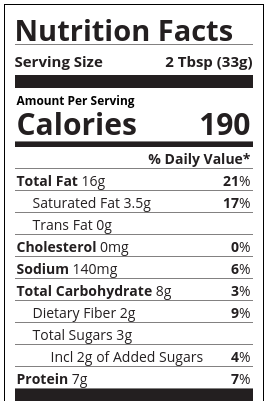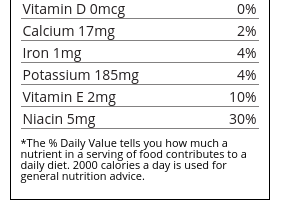Infrequent bowel movements, the feeling of not being able to empty yourself on the toilet, straining and having difficulty passing stools... these are all signs that you are constipated.
And these are all signs that no one wants to have to deal with.
There are a million and one reasons why someone may be constipated, but is eating peanut butter one of them?
Does peanut butter cause constipation or can you leave this page with relief that you can still enjoy those delicious peanut butter sandwiches and Reese's peanut butter cups without spending 30+ minutes trying to pass a bowel movement?
The good news is that peanut butter is not likely to cause constipation. The bad news is that there are the slim possibilities that it can.
Some Reasons Peanut Butter Might Make You Constipated

1) It's High In Saturated Fat
A serving (2 tbsp) of the popular Jif Creamy Peanut Butter will provide you with 3.5g of saturated fat, which is about 17% of the recommended daily value.

This is pretty high for such a small serving, and although higher amounts of fat are often associated with constipation relief and the increase of bowel movements, eating too much saturated fat is also linked to constipation.
Evidence from the National Health and Nutrition Examination Survey found that there is a connection between high saturated fat intake and constipation, in particular with diabetics and the elderly population who are already at higher risks of getting constipated.
That said, there really hasn't been much research in this particular area and it seems unlikely to cause such problems with the majority of the population.
Note: A 100g serving of peanuts alone will provide only 7g of saturated fat, which is a much lower percentage than most peanut butters (source: USDA). The higher saturated fat content of peanut butter is due to the added ingredients, which often includes hydrogenated vegetable oils.
*Trans-fat is the worst kind of fat and you will find some peanut butters with this unnatural substance. It is known to cause digestive issues and is best to avoid.
2) Too Much Niacin
Niacin, or vitamin B3, is important for many processes that go on in the body... playing a role in turning carbs into glucose, fat and protein metabolism and more.
Peanuts happen to be a great source this and are often recommended to those who are niacin deficient.
Going along with the example used above, a 2 tbsp serving of Jif Creamy Peanut Butter will provide you with 5mg of niacin, which is about 30% of the RDA.

That's great and all, however, one of the possible side effects of too much niacin listed on WebMD is constipation.
It's very unlikely that this would be the actual cause, but if you are already getting a lot of niacin in your diet and eating peanut butter on top of that, it is a possibility.
3) Intolerance to Peanuts
Food intolerances are non-allergic hypersensitivities and have nothing to do with allergic reactions where your body mounts an immune response to what it thinks is a problem.
Being intolerant to peanuts simply means that your body has difficulty digesting them.
These conditions may not be all that well understood by doctors, but nut intolerances do exist.
One such potential culprit for these hypersensitivities is salicylate. Salicylate sensitivity is not all that uncommon and is known to cause all sorts of symptoms, including constipation. If you do have this kind of hypersensitivity then you should also experience symptoms from raisins, prunes, blackberries, oranges, strawberries and others foods with high amounts this substance.
4) Peanut Allergies
Having an allergy to peanuts is much more likely to cause diarrhea, a problem on the opposite side of the infrequent bowel movement spectrum. But it seems that it could also lead to constipation, particularly for young children.
Constipation as a symptom of food allergies is something more prevalent for children under the age of 3, and then dissipates with age.
But Don't Throw Out All Your Peanut Butter Just Yet
This purpose of this article isn't meant to frighten you. While there are problems that can arise with peanut consumption, it should be noted that a healthy/natural peanut butter is much more likely to be beneficial for digestion and overall health.
Peanuts and peanut butter are a great source of fiber, protein, healthy fats, vitamins like niacin, folate, thiamin, vitamin B6, vitamin E, and minerals such as magnesium, phosphorous, potassium, zinc, iron and more.
It's Actually More Likely to Help Relieve Constipation

The good news is that, while it can potentially cause constipation, it isn't likely to.
In fact, it seems more plausible that peanut butter would help to relieve a case of constipation.
Lots of Fiber
Fiber provides no nutritional value but is extremely important for digestion and can help your body absorb other food nutrients better.
There are about 1.9g of fiber in 2 tbsp of peanut butter, which is about 8% of the RDA... pretty good for such a small amount. This fiber it provides comes in both forms, soluble fiber and insoluble fiber.
Soluble fiber is, as the name suggests, soluble in water. It absorbs water and turns into a gel-like substance. It can help to pull more water into the stool and soften it while also absorbing excess water as there is in the case of diarrhea.
Insoluble fiber is the more common of the two and adds bulk to the stool, helping increase how fast foods pass through the intestines. This type of fiber is great for treating constipation and a lack of it is often a cause of such.
Heavy In Fats
While we did go over how having too much saturated fat has been linked to constipation in elderly people and diabetics, fat isn't a bad thing and what you get from peanut butter is more likely to be of benefit, assuming you are eating a healthy type of peanut butter and not something with a bunch of added ingredients.
*Most of the fat content that peanuts provide is unsaturated anyhow.
Fat actually helps your body absorb nutrients, such as carotenoids for example. So if you want to increase the benefits of your veggies then you need to have enough fats as well... which might not be what you'd think.
Additionally, fats can act as a lubricant in your intestines which is exactly what you want if you are constipated... making hard stool easier to pass. And there is also some evidence that it can help stool hold onto more water, thus softening it.
Peanut Allergies
If you are allergic to peanuts then it is definitely advised that you avoid them altogether. That said, it's worth noting that having allergy to peanuts is much more likely to cause diarrhea than constipation... and most estimates are that somewhere around 0.6 - 1.4% of the population in the USA have this allergy.
An allergic reaction to peanuts or peanut butter happens when your body mistakes the proteins it has as a threat, which causes an immune response that may lead to cramps, itching, swollen throat, diarrhea, etc.
Symptoms will likely be noticeable within minutes after consumption.
Solutions for Proper BM's
1) Go Natural
If you do think peanut butter is the cause of your constipation, or someone else's, then it may be worth a try going natural if it isn't too bad.
Maybe it could be the peanuts of maybe it could be another added ingredient, or maybe it could be all the extra saturated fat that comes from hydrogenated vegetable oils in some of the less healthy products out there.
There are lots of possibilities and if you like peanut butter too much to go cold turkey, try a healthier natural product if you aren't already. The natural peanut butter products might not taste quite as great or be quite as creamy, but they are healthier and less likely to cause BM infrequencies.
2) Stop Eating Peanut Butter
Unfortunately the areas where peanut butter may cause constipation are very understudied. Methods for finding out whether or not peanut butter is the cause and what exactly it is about peanut butter need to improve and at this point it is easiest, and probably best, to just eliminate peanut butter from your diet if your condition is too much to bear.
A simple elimination diet is very easy to follow and can be done at no cost. The downside is that, if you find peanut butter to be the culprit, you won't know what exactly it is about it that is the cause. Is it the proteins, the salicylate, the fats?? Who knows.
3) Use an Alternative
Peanut butter isn't the only type of nut butter out there. While it may not taste quite as good to some, almond butter is healthier in a lot of ways and the taste is said to grow on you.
Almond butter is higher in vitamins, minerals, and fiber. However, peanut butter is a bit higher in the highly coveted, much sought after, protein.
It might be worth giving a try. You can substitute it in where you used to use peanut butter for many different foods/snacks.
*If your constipation is severe then it is always recommended that you consult with your doctor to find a solution.

